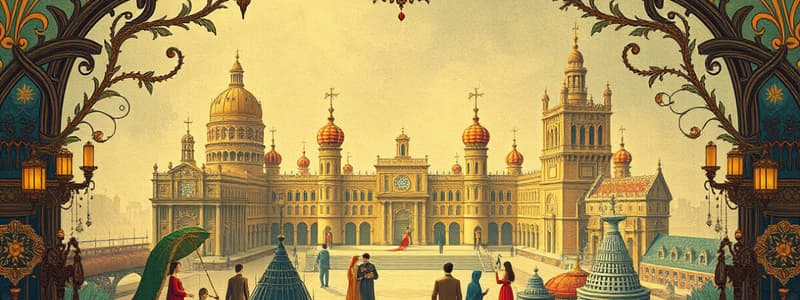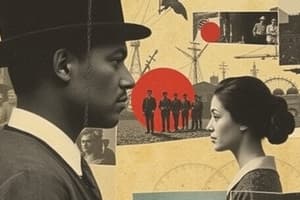Podcast
Questions and Answers
What is the primary focus of anthropology as indicated in the content?
What is the primary focus of anthropology as indicated in the content?
- Social Stratification
- Cultural Diversity
- Political Systems
- Culture (correct)
Which statement best describes the relationship between culture and human behavior?
Which statement best describes the relationship between culture and human behavior?
- Culture is only concerned with external behaviors of individuals.
- Culture has no impact on individual values and beliefs.
- Culture defines the mental and physical reactions of individuals within a social group. (correct)
- Culture is solely an individual phenomenon without societal influence.
Which anthropologist is associated with the early definition of culture focusing on groups of people?
Which anthropologist is associated with the early definition of culture focusing on groups of people?
- Edward Tylor
- Alfred Kroeber
- Franz Boas (correct)
- Clyde Kluckhohn
According to the content, what factor remains evident despite interconnection in society?
According to the content, what factor remains evident despite interconnection in society?
Which statement reflects Edward Tylor's definition of culture?
Which statement reflects Edward Tylor's definition of culture?
How does the concept of culture relate to values as described in the content?
How does the concept of culture relate to values as described in the content?
Which of the following statements about global society is true according to the content?
Which of the following statements about global society is true according to the content?
Which term is defined as 'the totality of the mental and physical reactions' of social group behavior?
Which term is defined as 'the totality of the mental and physical reactions' of social group behavior?
Which artistic form is indicative of social status in traditional Philippine culture?
Which artistic form is indicative of social status in traditional Philippine culture?
What does the design tradition of Okir primarily depict?
What does the design tradition of Okir primarily depict?
Which of the following works is attributed to Jose Rizal and shaped a nationalist identity?
Which of the following works is attributed to Jose Rizal and shaped a nationalist identity?
What is the focus of the traditional art forms mentioned in Philippine culture?
What is the focus of the traditional art forms mentioned in Philippine culture?
Which literary work by Francisco Balagtas criticized Spanish tyranny?
Which literary work by Francisco Balagtas criticized Spanish tyranny?
Which of the following statements about religious architecture during the Spanish colonial period is correct?
Which of the following statements about religious architecture during the Spanish colonial period is correct?
Which literary piece is NOT written by Jose Garcia Villa?
Which literary piece is NOT written by Jose Garcia Villa?
What is a primary feature of the epic poems and legends in Philippine literature?
What is a primary feature of the epic poems and legends in Philippine literature?
Which of the following art forms is NOT mentioned as a traditional craft in the Philippines?
Which of the following art forms is NOT mentioned as a traditional craft in the Philippines?
Which of the following is considered a traditional art form in the Philippines?
Which of the following is considered a traditional art form in the Philippines?
Flashcards are hidden until you start studying
Study Notes
Political Systems
- Political systems include absolute monarchy, anarchy, and authoritarianism, each with distinct governing structures.
- Anarchy is characterized by the absence of any form of government or authority.
- Absolute monarchy is a form of government where a single ruler holds ultimate authority.
- Authoritarianism involves strict control by the state over individual freedoms.
- Other systems include oligarchy, dictatorship, totalitarianism, and constitutional monarchy.
Cultural Systems
- Culture encompasses the traditional behaviors, beliefs, and norms developed and learned through generations.
- Cultural diversity refers to the variety of cultural expressions and practices within a society.
- The term "culture" was first articulated by Edward Tylor in 1870, emphasizing a collective set of knowledge, art, and laws.
- Franz Boas proposed that culture encompasses both mental and physical reactions of individuals within a social group.
Social Systems
- Social systems are defined by structures such as caste, class, and estate systems, which stratify individuals based on various criteria.
- Slavery represents a severe form of social stratification where individuals are treated as property.
- Indigenous people are often seen as a key component of social systems, representing original inhabitants of regions.
Global Society and Interconnection
- A global society emphasizes the interconnectedness of humans, where changes in one area can influence others.
- Despite advancements, differences based on ethnicity, religion, and social class continue to exist.
- Innovations like email, the Internet, and social networking have accelerated global interconnectivity, blending cultural, political, and social actions.
- These technologies create a shared platform for global voices and ideas, deepening societal ties across various contexts.
Evolution of the Concept of Culture
- The concept of culture has shifted over time, particularly with the inclusion of values that greatly impact daily life.
- American anthropologists Kroeber and Kluckhohn highlighted the significance of culture in shaping individual behavior and societal norms.
- Culture is viewed as both a collective and individual trait, reflecting interactions within the environment and among groups.
Diversity in Culture and the Arts
- The Philippines is celebrated for its rich cultural heritage and artistic diversity, attracting global tourism.
- Cultural expressions include traditional art, architecture, literature, music, dance, painting, and sculpture.
Highlights of Philippine Culture and the Arts
- Religious Iconography: Stone churches from the Spanish colonial period feature bas relief sculptures.
- Body Adornments: Bead jewelry, body tattoos, and headdresses historically indicate social status among Filipinos.
- Traditional Art Forms: Key practices include bamboo and rattan weaving, wood carving, metal smithing, and textile weaving.
- Okir Design Tradition: Influenced by Indian and Islamic elements, the Okir showcases figurative representations of animals, plants, and mythical figures.
- Oral Literature: Epic poems, legends, proverbs, songs, and riddles are passed down orally in diverse regional languages and dialects.
- Jose Rizal's Novels: Noli Me Tangere (1886) and El Filibusterismo (1891) played a significant role in fostering Philippine nationalism in the late 19th century.
- Francisco Balagtas' Florante at Laura: This epic poem subtly critiques Spanish colonial oppression.
Art and Architecture
- The Filipino architectural landscape reflects a blend of indigenous, Spanish, and contemporary styles, showcasing cultural resilience and creativity.
Literature
- Filipino Literature in English:
- N.V.M. Gonzalez: Winds of April (1940) and The Bamboo Dancers (1959) explore Filipino life and struggles.
- Jose Garcia Villa: Many Voices (1939) and Have Come, Am Here (1942) reflect the Filipino identity and experience.
- Bienvenido N. Santos: Works such as You Lovely People (1955) and Scent of Apples and Other Stories (1980) address themes of diaspora and identity.
- Nick Joaquin: The Woman Who Had Two Navels (1972) and A Question of Heroes (1977) delve into the complexities of Filipino culture.
- Francisco Sionil Jose: The God Stealer and Other Stories (1968) and Tree (1978) tackle social issues and national identity.
Studying That Suits You
Use AI to generate personalized quizzes and flashcards to suit your learning preferences.



